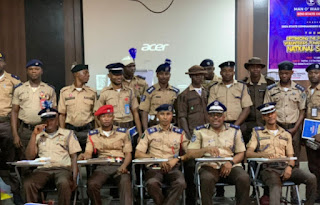Communiqué of the 1st National Retreat on the Open Government Partnership, Kaduna, Nigeria
A cross section of stakeholders from government, civil society and business met at a consultative retreat to prepare the National Action Plan (NAP) for the implementation of Open Government Partnership (OGP) on governance reform in Nigeria from 24th to 26th October 2016 at Hotel Seventeen in Kaduna State. The Honourable Attorney General of the Federation and Minister of Justice, Mr. Abubakar Malami, SAN, who also delivered the keynote address, declared the Retreat open.
In attendance were Dr. Balkisu Saidu who represented Prof Yemi Osinbajo, the Vice President of the Federal Republic of Nigeria, Architect Barnabas Yusuf Bala Bantex, the Deputy Governor of Kaduna State who represented Mallam El-Rufai, the Executive Governor of Kaduna State, Mr. Waziri Adio, Executive Secretary of the Nigerian Extractive Industries Transparency Initiative (NEITI), Dr. Joe Abbah, the Director General of the Bureau for Public Service Reform, Mr Ibrahim Magu, Acting Chairman of the Economic and Financial Crimes Commission (EFCC) and Mr. Oglafa Epipamo, Secretary, Independent Corrupt Practices and other Offences Commission. Relevant Directors involved in reform programs in their various Ministries represented the Ministers for Mines and Steel; Budget and National Planning; Power; Petroleum Resources, as well as Information and Culture. Other agencies that participated include the National Information Technology Development Agency (NITDA), the Nigeria National Petroleum Commission, (NNPC), and the National Orientation Agency (NOA).
Also in attendance was the Chief Executive Officer of the OGP International Secretariat, Dr. Sanjay Pradhan who was accompanied by the Deputy CEO, Mr. Joe Powell, a member of the Global OGP Steering Committee from Tanzania- Mr. Aidan Eyakuze, and the OGP Civil Society Coordinator for Africa and the Middle East, Ms Maureen Kariuki from Kenya. Also in attendance were many civil society leaders across the country and development partners such as the Department for International Development (DFID)/Justice 4 All (J4A), Partnerships to Engage, Reform and Learn (PERL), Swiss Embassy and United States Agency for International Development.
Recall that President Buhari attended the anti-corruption summit in May in London where he made several commitments to scale up efforts in the fight against corruption through implementing programs aimed at:
a) Exposing Corruption
b) Punishing the corrupt and providing support to victims who have suffered from corruption.
c) Driving out the culture of corruption.
In July, 2016, flowing from these commitments, the President led the country to join sixty-nine (69) other countries as the seventieth (70th) to sign unto the Open Government Partnership (OGP) which is a multi-stakeholder initiative focused on improving transparency, accountability, citizen’s participation and responsiveness to citizens through technology and innovation. OGP was formally launched in 2011 when the eight founding governments of Brazil, Indonesia, Mexico, Norway, Philippines, South Africa, United Kingdom and United States endorsed the Open Government Declaration.
In his opening remarks, the Deputy Governor commended the OGP process and explained that Kaduna state government is already operating an open budget process and direct monitoring of citizens’ feedback on all projects across the state.
The Chief Executive Officer of Open Government Partnership, Dr. Sanjay Pradhan praised the efforts of Nigeria in joining what he described as the global elite club of reformers. He enjoined participants to prepare a plan that is ambitious, smart but realizable as other African countries are looking up to Nigeria. The CEO expressed the willingness of the OGP secretariat to provide any support and guide that Nigeria may require in the NAP preparation process.
The discussions that followed were frank and interactive. In line with the multi-stakeholder nature of the OGP, both civil society and government representatives participated equally to co-create the National Action Plan. Commitments were drawn up along the following four thematic OGP core principles in line with the contextual priorities drawn from President Buhari’s commitments at the London Anti-Corruption Summit:
a) Improving Fiscal Transparency
b) Access to Information
c) Anti-Corruption and Asset Disclosure
d) Citizen Engagement and Empowerment
These thematic areas were further broken down into actionable activities to cover key elements of the plan, such as:
- Implementing an open contracting standard to ensure more effective citizens participation across the budget cycle and procurement process.
- Implementing open contracting and to ensure a more effective citizens participation across the budget cycle and procurement process.
- Enhancing disclosure of production and payment information in the extractive sector.
- Adopting common reporting standards and signing on to the Addis Tax initiative.
- Improving familiarity by citizens and civil/public servants with the Freedom of Information Act (FOIA) by public servants and citizens.
- Increasing compliance with the FOIA by public institutions.
- Establishment of a public register of beneficial ownership information.
- Establishment of an internationally endorsed guideline for the transparent and accountable management of stolen assets.
- Development of common principles governing the payment of compensation to victims of corruption and ensure that the payments are made safely, fairly and in ...



Comments